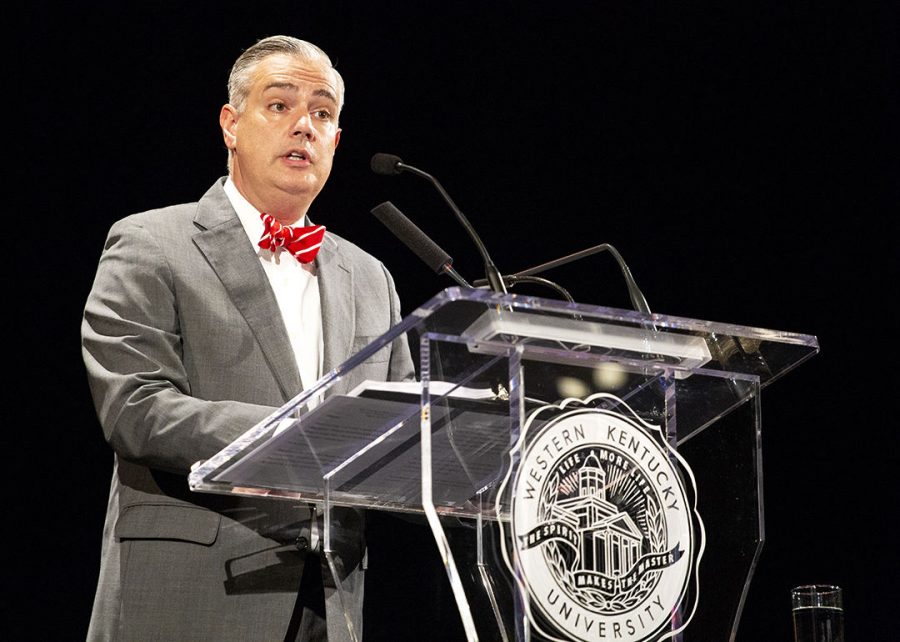Caboni announces pay raises for faculty and staff and more at convocation
August 24, 2018
President Timothy Caboni announced significant salary increases for WKU faculty and staff, officially unveiled the university’s new 10-year strategic plan and discussed the university’s future at the annual faculty and staff convocation on Friday.
Caboni said that all WKU faculty and staff who were hired on or before July 1, 2018, will receive a 2 percent salary increase on Jan. 1. The faculty and staff members who receive the raises will also be eligible for up to a 4 percent merit increase.
“It is important that we support all of our employees with a reasonable cost of living increase, but it is equally important to reward those employees who are performing at the highest levels,” Caboni said. “This balance allows us to do both.”
The raises come from a 4 percent salary increase pool, which was created by the 4 percent tuition increases approved on June 22. WKU’s last 4 percent salary increase took place in 2008, and increases since then have been minimal or nonexistent, according to documents provided by the Board of Regents finance committee.
“You, our faculty and staff, are the lifeblood of this institution,” Caboni said, addressing those in attendance.
Caboni also officially unveiled WKU’s 10-year strategic plan and other initiatives aimed at improving retention efforts in the fall.
The strategic plan, titled “Climbing to Greater Heights,” was designed to shape the next decade of the university. It aimed at improving student enrollment and retention and its creation took place over the last year with six working groups meeting throughout the year. The Board of Regents approved the plan on Aug. 3.
The 2018-28 strategic plan includes three sections: the students, the university and the community. For every part, the plan provides goals, strategies and metrics, or ways of measuring the success of the goals with possible targets for 2027-28.
One area of the strategic plan that has raised questions from faculty and staff is the “Comprehensive Advising Program,” which focuses on advising first-and-second-year students and addressing their academic, financial, physical, mental and social questions.
Caboni said that the first-and-second-year students will receive advising at Downing Student Union and will be advised within their individual colleges after the second year of advising.
Some faculty and staff have voiced concerns about the new advising program, saying they worry that it will not be as beneficial to the students because central advisers may not be able to answer students’ questions for a specific major or department, as reported by the Herald on Aug. 3.
WKU’s former advising method included professors meeting individually with students about their class schedules within specific colleges.
“I’ve heard the concerns, and we’ve worked together with deans to address many of those,” Caboni said. “However, to increase persistence and success rates across the institution, we simply must try something new. We know from our peers nationally that well executed centralized advising improves first to second year retention.”
During his speech, Caboni also discussed the WKU Opportunity Fund, which he announced last spring at his investiture ceremony. The fund is an effort to raise $50 million to support students who are unable to afford experiences like study abroad and attending conferences. President Caboni’s wife, Kacy, will lead the Opportunity Fund.
The first donation to the fund—worth $450,000—has been given by the James Graham Brown Foundation. Caboni said the donation will create the WKU Center for Academic Resources and Success (CAReS), which will provide advising for 200 first-generation, low-income and underrepresented minority students.
“It will serve as the primary resource for academic support with access to mentoring, tutoring, financial assistance and other barriers that prevent these students from entering or from persisting once they get here,” Caboni said.
Martha Sales, executive director of WKU TRIO Programs and WKU’s Intercultural Student Engagement Center, will direct the new program.
As he addressed faculty and staff, Caboni took a moment to acknowledge the challenges that the university faced during his inaugural year, including budget cuts and position eliminations to balance a potentially $40 million budget deficit.
Caboni said that facing financial challenges was not how he envisioned his first year as WKU’s president, but acknowledged the challenges were necessary.
“I can’t tell you how proud I am of the way our campus responded,” Caboni said. “And yes, we bent as a university, but we did not break. What we have achieved together is a university that is stronger, leaner, and poised for success going forward.”
Before the unveiling of the strategic plan, Terry Ballman, WKU’s new provost and vice president of academic affairs, gave her first address at the convocation. During her speech, she described her experience growing up as a first-generation college student and her professional experience prior to becoming provost. She also emphasized the importance of improving the student experience.
“I’m committed to WKU’s mission to help students of all backgrounds be productive, engaged and socially responsible citizens and leaders of a global society,” Ballman said. “This is a relational campus, and the more people I meet, the more I have no doubt that together we can overcome any challenges we may have as we achieve greater heights.”
Nicole Ziege can be reached at 270-745-6011 and [email protected]. Follow Nicole Ziege on Twitter at @NicoleZiege.












